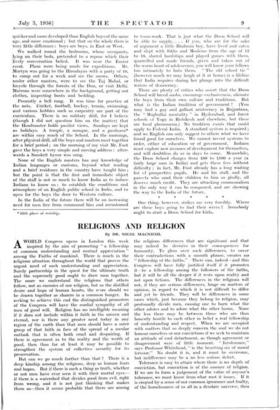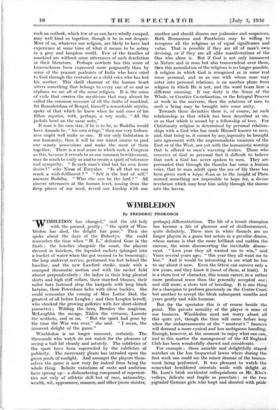RELIGIONS AND RELIGION
By DR. NICOL MACNICOL
A WORLD. Congress opens in London this week inspired. by the aim of promoting " a fellowship of common understanding and mutual appreciation " among the Faiths of mankind. There is much in the religious situation throughout the world that proves the urgent need of such understanding and appreciation. Surely partnership in the quest for the ultimate truth and the supremely good ought to draw men together. The more we understand the religions that others follow, not as enemies of our religion, but as the distilled desire and hope of human hearts, the more should we be drawn together as sharers in a common hunger. In seeking to achieve this end the distinguished promoters of the Congress will have the cordial sympathy of all men of good will. Religion has no intelligible meaning if it does not include within it faith in the unseen and eternal, nor is there any greater need today in any region .of the . earth than that men should have a surer grasp of that faith in face of the spread of a secular outlook that is often both cruel and despairing. If there is .agreement as to the reality and the worth of good, then thus far at least it may be possible to strengthen the system of collective. security for its preservation.
But can we go much further than that ? There is a deep kinship among the religions, deep as human fears and hopes. But if there is such .a thing as truth, whether or not men have ever seen it with their mortal eyes— if there is a watershed that divides good from evil, right from wrong, .and it is. not just thinking that makes them so—then it seems probable that there are among the religions differences that are significant and that may indeed be decisive in their consequences for humanity. To gloss over such differences, to cover their contradictions with a smooth phrase, creates no " fellowship of the faiths." • There can, indeed—and this Congress will have fully justified itself if it promotes it—be a fellowship among the followers of the faiths, but it will be all the deeper if it rests upon reality and not upon fictions. The differences in the religions wilt not, if they are serious differences, hinge on matters of opinion, in regard to which it is not difficult to differ and yet be friends. They will be differences in some cases which, just because they belong to religion, may profoundly divide men, causing one to burn what the other adores and to adore what the other burns. None the less there may be between those who are thus honestly hostile to each other in belief a real fellowship of understanding and respect. When we are occupied with matters that so deeply concern the soul we do not honour ourselves or our convictions if we seek to maintain an attitude of cool detachment, as though agreement or disagreement were of little moment. " Intolerance," says Professor Whitehead, " is the besetting sin of moral fervour." No doubt it is, and it must be overcome, but indifference may be a no less serious defect.
Tolerance is easy to attain where there is no depth of conviction, but conviction is of the essence of religion. If we are to form a judgement of the value of anyone's tolerance, we must know from what root it issues. If it is creased by a sense of our common ignorance and frailty, of the homelessness of us all in a desolate universe, then such an outlook, which few of us can have wholly escaped, may well bind us together, though it be in our despair. Most of us, whatever our religion, are likely to have had experience at some time of what it means to be astray in a grey and lampless world. Few of the families of mankind are without some utterances of such dereliction in their literature. Perhaps nowhere has this sense of homesickness been expressed more poignantly than by some of the peasant psalmists of India who have cried to God through the centuries as a child cries who has lost his mother. This shrill clamour of the human heart utters something that belongs to every one of us and as orphans we are all of the same religion. It is the sense of exile that creates the mysticism that may almost be called the common measure of all the faiths of mankind. Sri Ramakrishna of Bengal, himself a remarkable mystic, spoke of that which he knew when he said once of his fellow mystics, with, perhaps, a wry smile, " All the jackals howl on the same note."
If man is his own star, if he is to be, as Buddha would have Ananda be, " his own refuge," then our very forlorn- ness might well make us one. If our only habitation is our humanity, then it will be our wisest course to pool our scanty possessions and make the most of them together. There is a real sense in which such a Congress as this, because it reveals to us our common bewilderment, may do much to unify us and to create a spirit of tolerance and sympathy. " Is each man's God but his own fierce desire?" asks Nisus of Eurvalus. "Is all that we can reach a wish-fulfilment ? " " Self is the lord of self," answers Buddha. " Who else can be the lord ? " All sincere utterances at the human level, issuing from the deep places of our need, reveal our kinship with one another and should disarm our jealousies and suspicions. Both Humanism and - Pantheism may- be willing to recognise all the religions as of equal significance and value. That is possible if they are all of man's own devising, or if they are all alike manifestations of the One who alone is. But if God is not only immanent in Nature and in man but also transcendent over them, then this assimilation of the religions is no longer possible. A religion in which God is recognised as in some real Sense personal, and so as one with whom man may enter into personal relations, is • on another • plane from religion in which He is not, and the word bears here a different meaning. If our deity is - the Sense of the Whole, or Creative Co-ordination, or the Integral Process at work in the universe, then the relations of men to such a being may be brought into some unity.
Towards these divinities there is, of course, no such relationship as that which has been described as sin, or as that which is meant by a fellowship of love. For Christianity religion is determined by personal relation- ships with a God who has made Himself known to men, and, that being so, it cannot by any„ingenuity be brought into agreement with the impersonalistic monisms of the East or of the West, nor yet with the humanistic worship that is offered to men's wavering desires. Those who conceive of God as personal find it difficult to believe that such a God has never spoken to men. They are persuaded that through the thunder has come a human voice, that to man adrift upon the sea of life there has been given such a Xoryo; Otios as to the insight of Plato seemed something not impossible to hope for, a divine revelation which may bear him safely through the storm; into the haven.















































 Previous page
Previous page